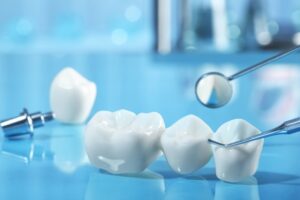
Dental crowns are a common solution for restoring damaged or weakened teeth. Whether used after a root canal, to protect a cracked tooth, or to improve appearance, crowns play a vital role in modern dentistry. However, if you’re going in for this investment in your oral health, you’re probably wondering how long they’ll last. Let’s dive into the answers!
Average Lifespan of a Dental Crown
On average, dental crowns last between 10 to 15 years. However, with excellent care, some crowns can last 20 years or more. The lifespan depends on several factors including the material used, the patient’s oral hygiene, and lifestyle habits.
Types of Crown Materials and Their Durability
The type of material used for the crown significantly influences its longevity.
- Porcelain or ceramic crowns: These are often used for front teeth because they closely resemble natural teeth. While aesthetically pleasing, they can be more prone to chipping and cracking. Average lifespan: 10–15 years.
- Porcelain-Fused-to-Metal (PFM) crowns: These crowns combine the natural look of porcelain with the strength of a metal base. They are more durable than all-porcelain crowns but can sometimes show a dark line near the gum. Average lifespan: 10–15 years.
- Metal crowns (gold or alloy): Extremely durable and less likely to chip or wear down, metal crowns are ideal for molars. Their biggest drawback is aesthetics, as they don’t resemble natural teeth. Average lifespan: 15–20 years or longer.
- Zirconia crowns: Known for both strength and appearance, zirconia crowns are a popular choice. They are highly resistant to wear and can last a long time with proper care. Average lifespan: 15+ years.
Factors That Influence Longevity
Several lifestyle and oral health factors affect how long a crown will last.
- Oral hygiene: Brushing twice a day, flossing daily, and regular dental checkups help prevent decay and gum disease, which can compromise the crown’s foundation.
- Teeth grinding (bruxism): Chronic grinding or clenching puts pressure on crowns, especially porcelain ones, and can cause them to crack or wear down. A night guard may help protect your investment.
- Diet: Hard, sticky, or overly chewy foods can damage crowns over time. Avoiding habits like chewing ice or opening packaging with your teeth also helps.
- Underlying tooth health: Crowns rely on the health of the tooth beneath them. If decay or infection occurs under the crown, it may need to be replaced sooner.
Signs a Crown May Need Replacement
Even the best crown won’t last forever. Signs it may be time for a new one include:
- Sensitivity or pain in the crowned tooth.
- Visible wear, cracks, or chips.
- Looseness or movement.
- Receding gums exposing the edge of the crown.
Dental crowns are a reliable, long-term solution for protecting and restoring teeth. While the average lifespan ranges from 10 to 15 years, careful maintenance can extend their usefulness for decades. Regular dental visits, good hygiene, and smart lifestyle choices all play a role in getting the most out of your crown.
About the Author
Dr. Zane Wayland Berry graduated Magna Cum Laude from Virginia Commonwealth University prior to completing a residency in Advanced Education in General Dentistry at Langley Air Force Base and serving as a dentist in the U.S. Air Force Dental Corps for two years. He is also a member of the Academy of General Dentistry and the American Dental Association. Dr. Berry and our team of experts at Troisi Dentistry employ CEREC technology for one-visit crowns, meaning you won’t have to make multiple visits to the dentist and wait for a new crown! We also welcome insurance and offer financing. Schedule your appointment with us through our website or call our Chesapeake office at (757) 548-1611.
